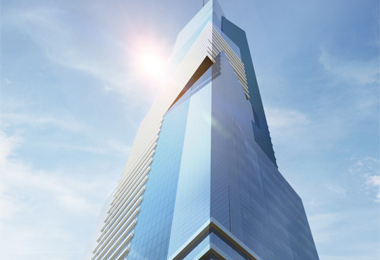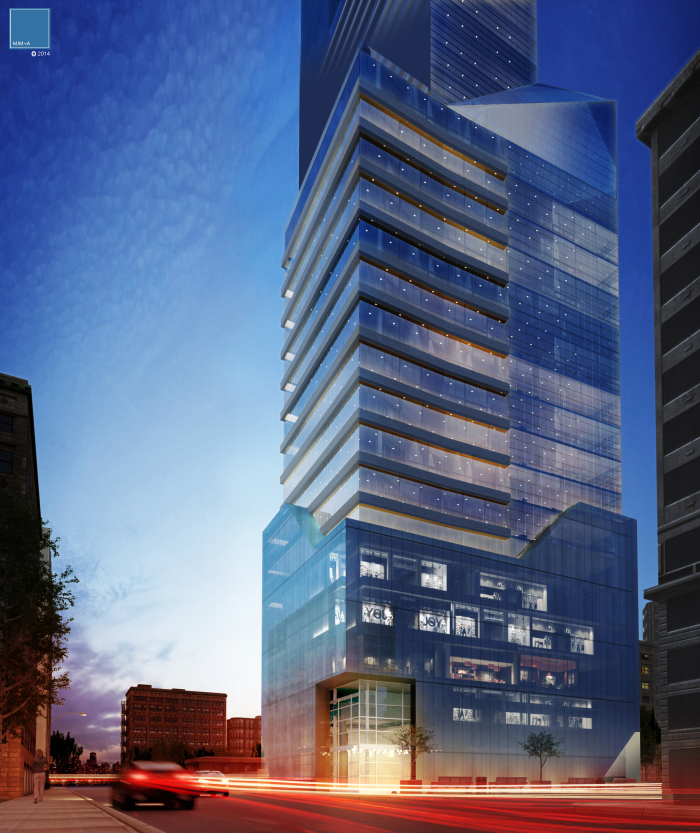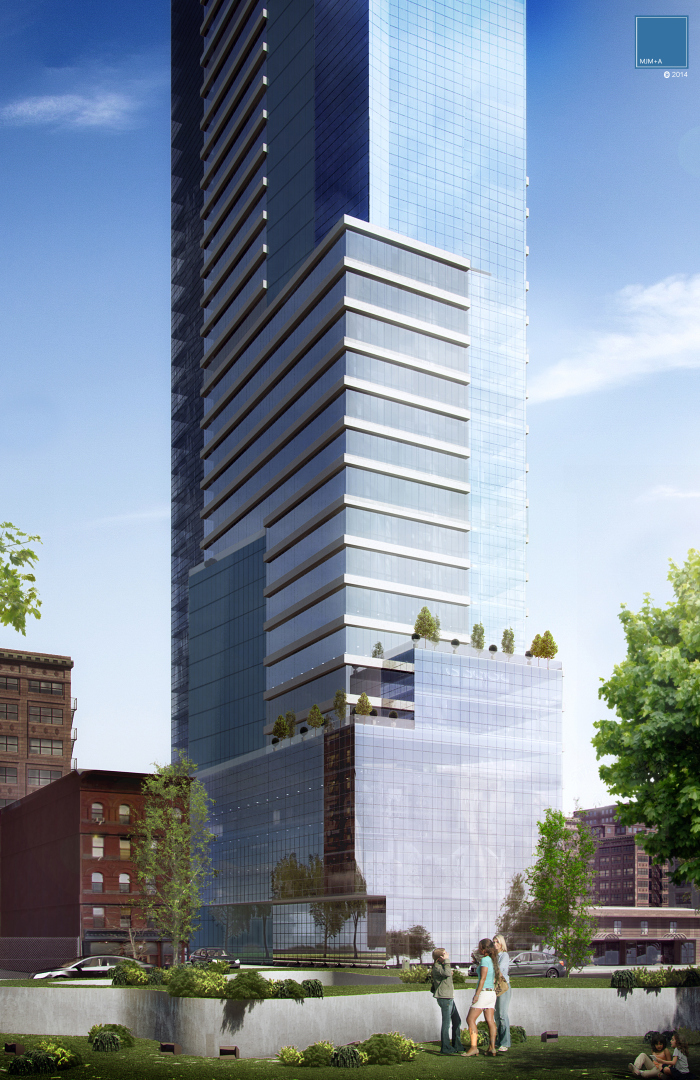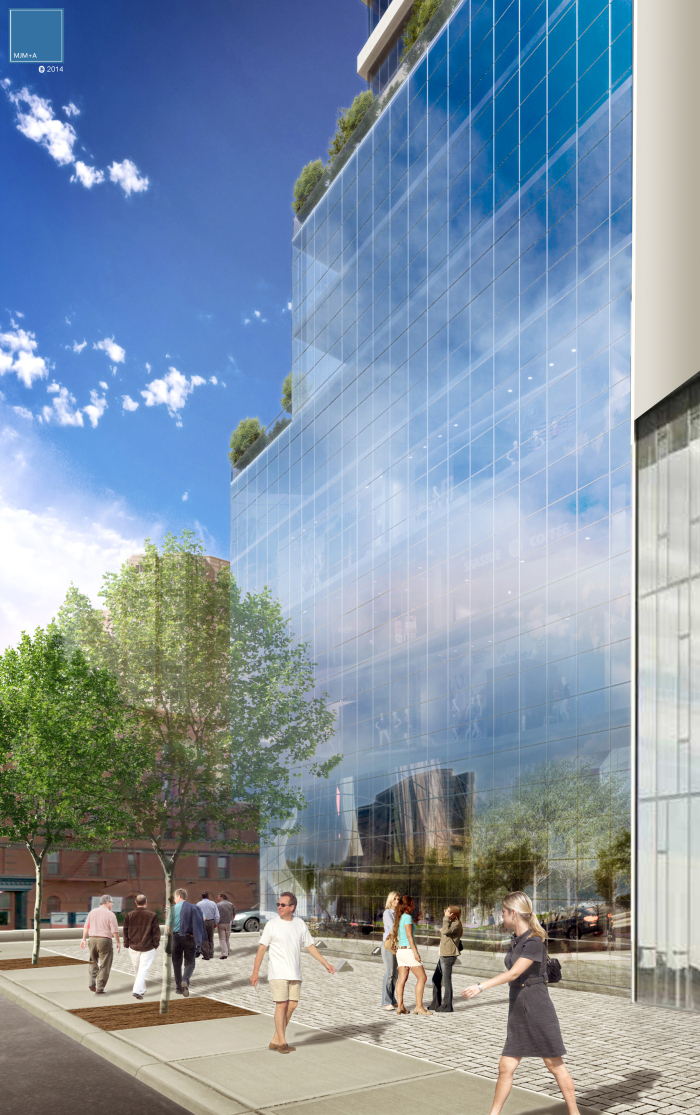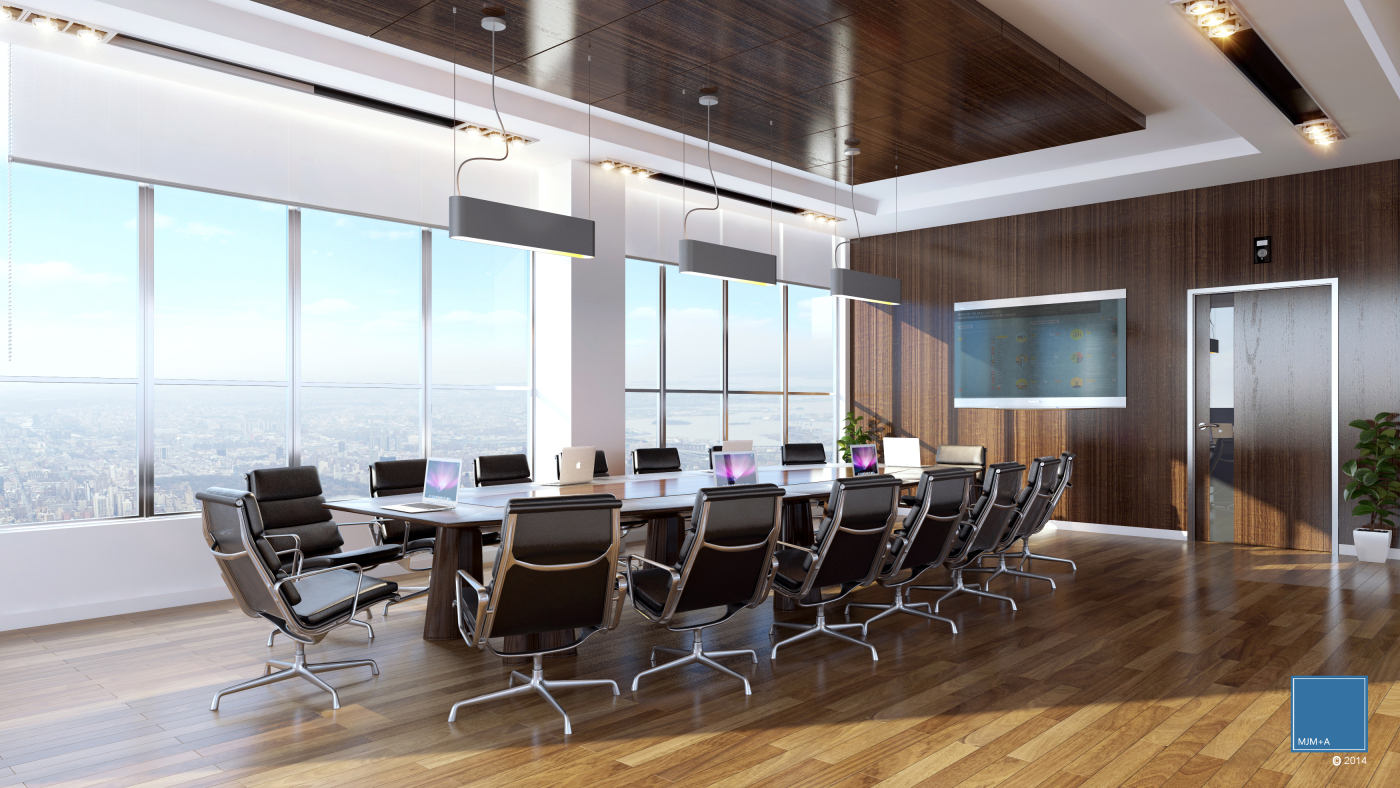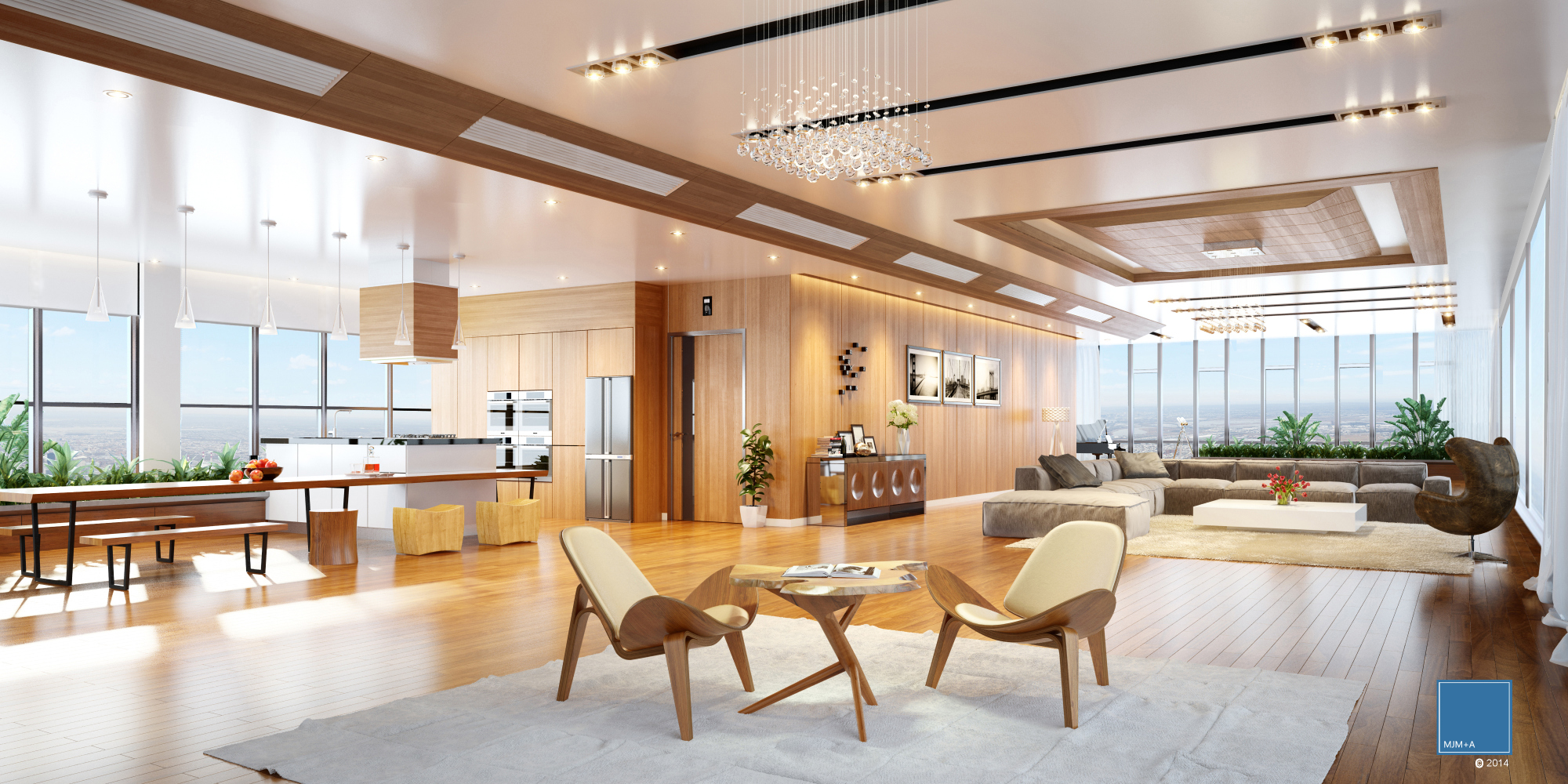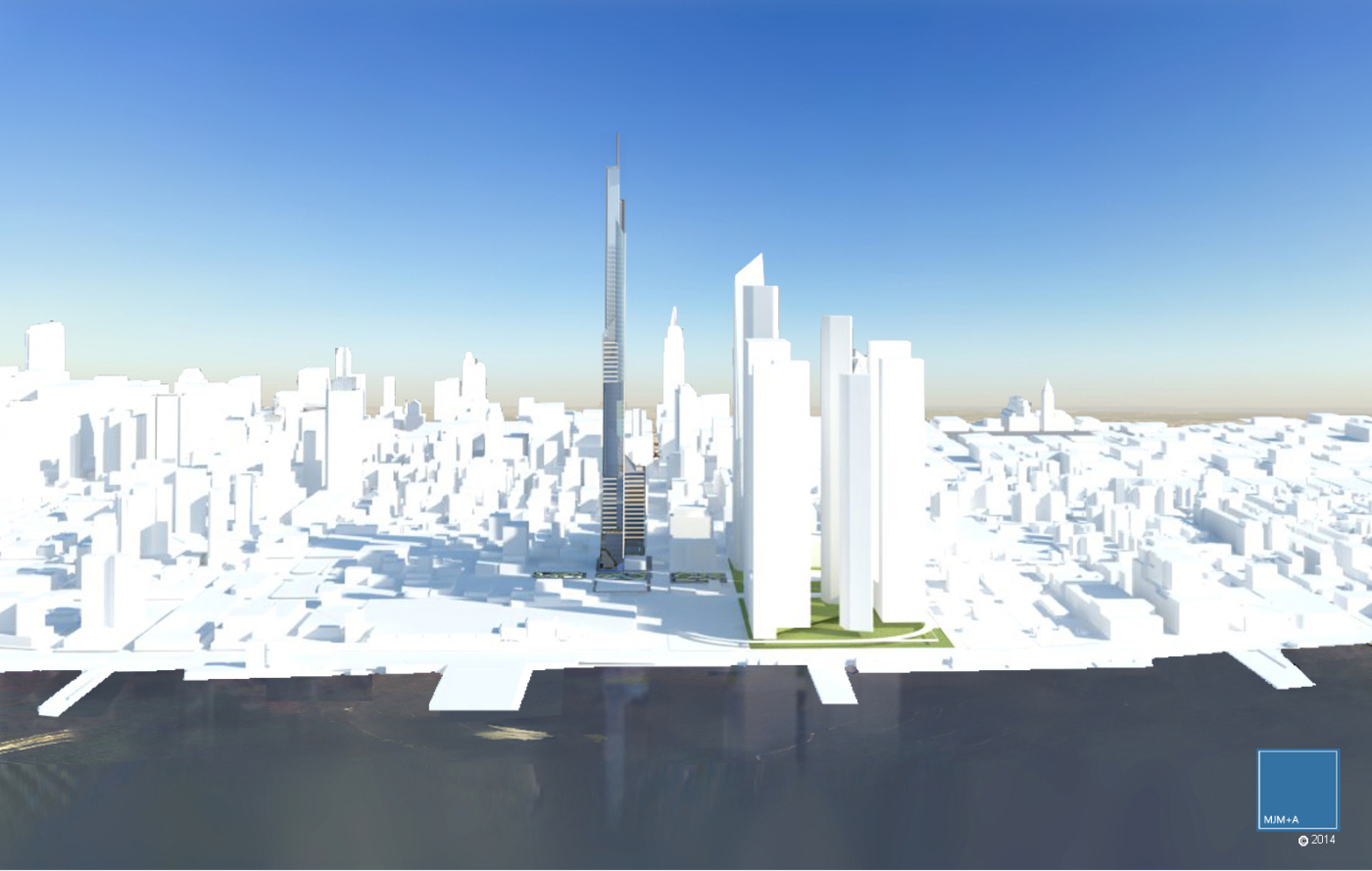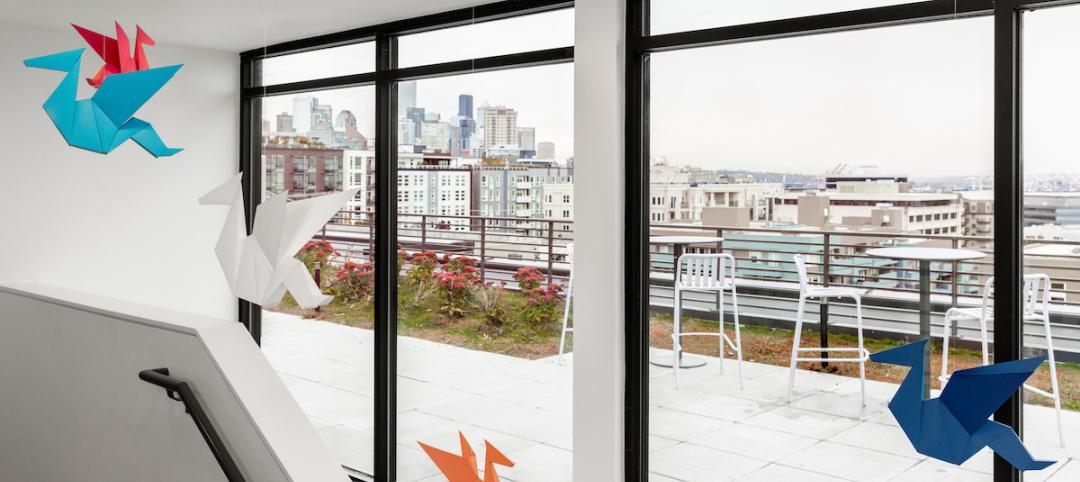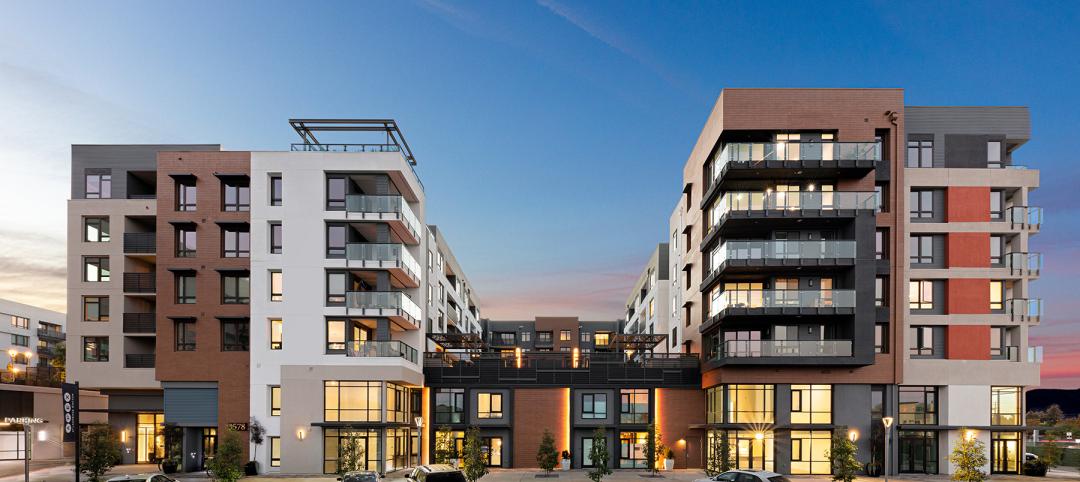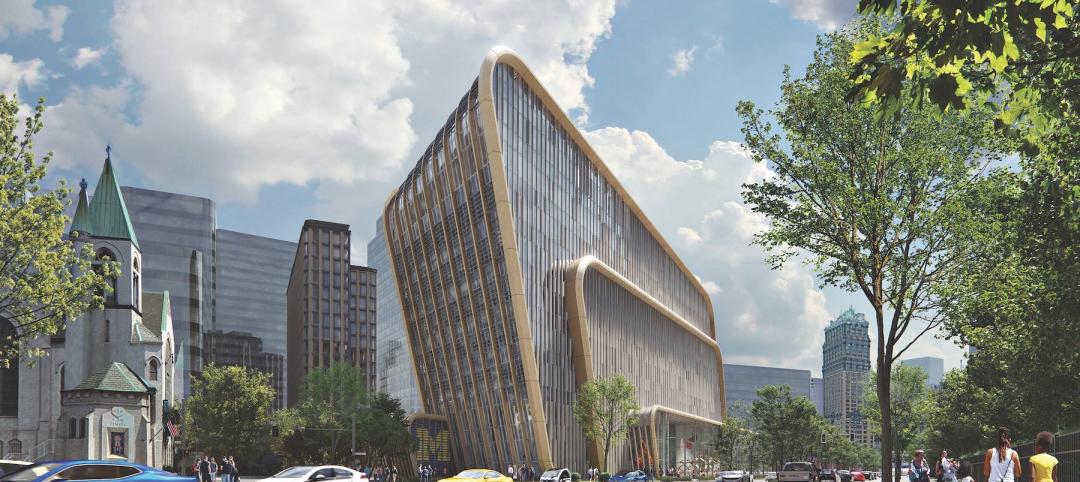MJM + A Architects recently unveiled its plans for the construction of Hudson Spire, a 1,800-foot-tall tower that would become the tallest building in North America.
The structure includes approximately 1.2 million sf for high-end retail, office, hotels, and residences in the heart of Hudson Yards, a dynamic new neighborhood and cultural center in development on 10th Avenue from 34th to 40th Street, on the site of what was formerly the West Side Rail Yards.
Hudson Spire would be on a section of the new Hudson Boulevard, overlooking a park-like public space that is the centerpiece of the neighborhood. The building will face the Hudson River and be less than two blocks from the Jacob Javits Convention Center.
Michael J. Macaluso, Principal and Founder of MJM + A Architects, was retained by the property owners and their exclusive real estate broker, Massey Knakal, to come up with a grand design for the building.
“This is a once-in-a-lifetime opportunity that architects dream of,” said Macaluso. “When the senior executives of Massey Knakal, James Nelson and Bob Knakal, and Anthony Volpe of the Rosenthal Group first laid out for us the challenge of creating an 1,800-foot-high mixed-use tower for Hudson Yards, we were both thrilled and inspired. As architects, our job is to interpret the dreams of others. The creative geniuses of our design studio, led by my partner Keith Lucas, came up with a stunning vision of a vibrant glass structure that literally jumps from its bases and soars to the stars.”
Hudson Spire is slated to have 110 stories, offering a unique combination of commercial and residential space. Floors one through five will host upscale restaurants and retailers, on top of which will be 15 stories of office space. Floors 21 through 85 are designated for three separate high-end hotel properties, each with approximately 200 guest rooms, lavish amenities, and event/conference space.
The top 25 floors will be luxury residences, with one or two units per floor, concierge service, private elevators, glass walls on all four sides, and stunning views that extend from the Statue of Liberty to the George Washington Bridge and beyond.
“Hudson Yard represents the last frontier in undeveloped Manhattan property,” said Macaluso, “and Hudson Spire will be right in the middle of this dynamic new neighborhood with all its cultural attractions, entertainment, and river views. And its close proximity to the Javits Center makes it an excellent choice for Fortune 500 executive travelers.”
Superthin skyscraper design
Hudson Spire follows the “super tall / super thin” strategy of other recent luxury high-rise residences, mandated by the space, cost and zoning realities of Manhattan property. Starting at a base width of approximately 100 feet, the edifice will be physically set back as it rises, tapering to just 75 feet in width at the top floors.
The structural challenges of high winds and complex elevator requirements are solved with a hybrid reinforced concrete and steel frame, encased by alternating reflective and non-reflective high powered glass.
“There’s not a lot of façade to work with,” said MJM + A's Lucas, “so we wanted to make it visually interesting. We decided, rather than go with a typical singular surface, let’s do something different and more dynamic. Let’s vary the composition of the glass color and reflective property, with lots of intersecting angles that play off one another, so that sunsets and city views will look different on one face of the building than on the others.”
At 1,800 feet, Hudson Spire will be even taller than the recently-constructed Freedom Tower at the World Trade Center. “Since 9/11, the city has gone through a long healing process. The owners of the property want to create a building that looks forward, not back, that will uplift the city but is unrelated to 9/11,” says Macaluso. “Hudson Spire reflects the dawn of a new age, emphasizing the global character of New York City as a business hub, a tourist destination, and the many foreign residents who now call it home. Hudson Spire will be a welcome addition to the Manhattan skyline, and to the spirit of the city itself.”
Related Stories
| Aug 29, 2022
Montana becomes first U.S. state to approve 3D printing in construction
Montana is the first U.S. state to give broad regulatory approval for 3D printing in building construction.
Giants 400 | Aug 29, 2022
Top 175 Multifamily Sector Architecture + AE Firms for 2022
Perkins Eastman, Solomon Cordwell Buenz, KTGY, and Gensler top the ranking of the nation's largest multifamily sector architecture and architecture/engineering (AE) firms for 2022, as reported in Building Design+Construction's 2022 Giants 400 Report. Note: This ranking includes all multifamily sector work, including apartments, condos, student housing, and senior living facilities.
| Aug 26, 2022
Idaho Building Code Board considers gutting large part of state energy code
Idaho Building Code Board considers gutting large part of state energy code.
Multifamily Housing | Aug 25, 2022
7 things to know about designing for Chinese multifamily developers
Seven tips for designing successful apartment and condominium projects for Chinese clients.
Giants 400 | Aug 25, 2022
Top 155 Apartment and Condominium Architecture Firms for 2022
Solomon Cordwell Buenz, KTGY, Gensler, and AO top the ranking of the nation's largest apartment and condominium architecture and architecture/engineering (AE) firms for 2022, as reported in Building Design+Construction's 2022 Giants 400 Report.
University Buildings | Aug 25, 2022
Higher education, striving for ‘normal’ again, puts student needs at the center of project planning
Sustainability and design flexibility are what higher education clients are seeking consistently, according to the dozen AEC Giants contacted for this article. “University campuses across North America are commissioning new construction projects designed to make existing buildings and energy systems more sustainable, and are building new flexible learning space that bridge the gap between remote and in-person learning,” say Patrick McCafferty, Arup’s Education Business Leader–Americas East region, and Matt Humphries, Education Business Leader in Canada region.
| Aug 25, 2022
New York City’s congestion pricing aims to reduce traffic, cut carbon
Officials recently released an environmental assessment that analyzes seven different possible pricing schemes for New York City’s congestion pricing program.
Sponsored | BD+C University Course | Aug 24, 2022
Solutions for cladding performance and supply issues
This course covers design considerations and cladding assembly choices for creating high-performance building envelopes — a crucial element in healthy, energy-efficient buildings.
| Aug 24, 2022
California’s investment in ‘community schools’ could transform K-12 education
California has allocated $4.1-billion to develop ‘community schools’ that have the potential to transform K-12 education.
| Aug 24, 2022
Architecture Billings Index slows but remains healthy
For the eighteenth consecutive month architecture firms reported increasing demand for design services in July, according to a new report today from The American Institute of Architects (AIA).


